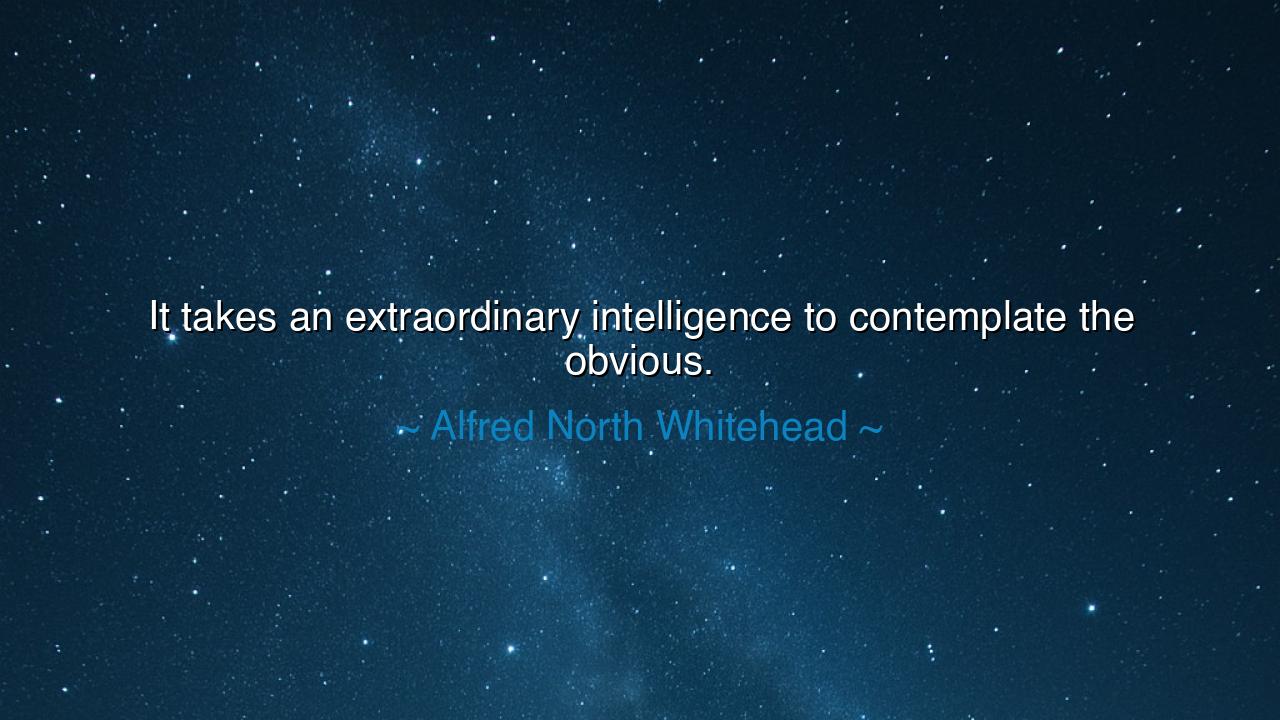
It takes an extraordinary intelligence to contemplate the






The words of Alfred North Whitehead, philosopher and mathematician, strike like lightning from the heavens: “It takes an extraordinary intelligence to contemplate the obvious.” In this single phrase, Whitehead unveils one of the deepest paradoxes of the human mind — that what is most familiar to us is often what we least understand. He reminds us that truth is not hidden in distant mysteries but glimmers in the very fabric of what we see each day, waiting for the rare mind that can look again and truly see. For the ordinary eye passes over the commonplace and deems it known; but the extraordinary mind, filled with wonder and humility, pauses before it, perceives its hidden depth, and thus discovers the eternal in the everyday.
To understand the origin of this thought, one must enter the world of Alfred North Whitehead, a man who lived at the dawn of the modern age, when science was unlocking the secrets of the universe. He co-authored Principia Mathematica with Bertrand Russell, a monumental work of logic, yet he was not content with equations alone. Whitehead sought to grasp the living pattern that runs through all things — the unity between thought and existence, between mathematics and life. In contemplating nature, he saw that even the most “obvious” truths — the rising of the sun, the flow of time, the breath of life — conceal infinite layers of meaning. The foolish mind looks past them; the wise mind contemplates them. Thus, when he declared that it takes an extraordinary intelligence to contemplate the obvious, he was speaking not of cleverness, but of depth of vision — the ability to find mystery in the familiar.
The ancients understood this truth well. In the temples of Delphi, the oracle bore the inscription, “Know thyself.” At first glance, these words seem simple, even obvious — who does not know themselves? And yet philosophers from Socrates to Plotinus spent lifetimes uncovering the depths of that single command. The obvious, when truly contemplated, unfolds into the infinite. To “know thyself” is not merely to recognize one’s name or history, but to gaze inward until the soul itself becomes transparent. So too, Whitehead reminds us that the truly intelligent do not seek novelty for its own sake — they return to the obvious, the ordinary, the self-evident, and through meditation, transform it into revelation.
Consider the story of Isaac Newton, who sat beneath an apple tree and watched an apple fall. To all others, this was a scene too mundane to notice — the simple law of gravity in motion. But Newton’s mind was different; he contemplated the obvious. He did not see a fruit falling — he saw the universe obeying an unseen order. From that moment of simple observation was born the law that would describe the motion of stars and planets, a law that bound heaven and earth in one truth. Thus, Newton’s genius was not that he discovered something new, but that he saw the eternal within what every man had already seen and ignored. That is the power of extraordinary intelligence: to see what is before all eyes and yet perceived by none.
In our modern world, where knowledge multiplies faster than wisdom, Whitehead’s warning is more vital than ever. We chase the novel and overlook the essential; we seek the farthest stars and forget the ground beneath our feet. We have learned to split atoms and decode genes, yet we pass by the sunrise without awe, and the beating of our own hearts without gratitude. Extraordinary intelligence is not the accumulation of information but the awakening of perception — to look upon what is ordinary with the freshness of a soul newly born. The obvious becomes holy when contemplated with reverence.
Let us also recall Leonardo da Vinci, the man who found the cosmos in a drop of water and the divine in the curve of a smile. His notebooks overflow not with grand theories but with meditations on simple things — the flight of birds, the fall of hair, the ripple of water. His genius lay in this: that he saw. He did not merely observe the world; he entered into communion with it. To him, the obvious was never small — it was the doorway to the infinite. His art and science were born not from ambition, but from delight in the ordinary, from that same contemplative intelligence that Whitehead exalts.
Thus, the lesson of Alfred North Whitehead’s words is clear and timeless: true intelligence is not the pursuit of the complex, but the rediscovery of the simple. The highest wisdom is not found in distant theories, but in seeing the world anew — the way a child looks at rain or a sage looks at truth. Cultivate the habit of contemplation. When you drink water, know the miracle of life it sustains. When you speak, know the wonder of language that carries thought into the hearts of others. When you love, feel the mystery of connection that binds all beings. These things are obvious, yet they are also divine.
So, dear listener, take this teaching as your guide: do not hurry past the familiar. Pause, look, and see again. The obvious is not shallow — it is the surface of eternity. The wise know that revelation hides in plain sight, that enlightenment is not found in distant lands, but in the patient gaze upon what already is. For it truly does take an extraordinary intelligence to contemplate the obvious — and in doing so, one may find not only knowledge, but peace, beauty, and the infinite heartbeat of truth itself.






AAdministratorAdministrator
Welcome, honored guests. Please leave a comment, we will respond soon